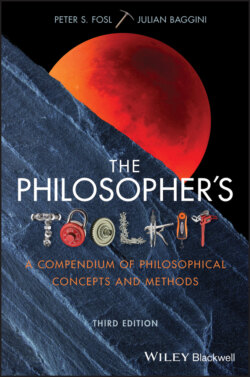Читать книгу The Philosopher's Toolkit - Julian Baggini, Julian Baggini - Страница 74
Too narrow or too broad?
ОглавлениеThat’s why it’s important to find a definition that does the right kind of work. If one’s definition is too narrow or idiosyncratic, it may be that one’s findings cannot be applied as broadly as could be hoped. For example, if one defines ‘man’ to mean bearded, human, male adult, one may reach some rather absurd conclusions – for example, that many Native American males are not men. A tool for criticism results from understanding this problem. In order to show that a philosophical position’s use of terms is inadequate because too narrow, point to a case that ought to be covered by the definitions it uses but clearly isn’t.
If, on the other hand, a definition is too broad, it may lead to equally erroneous or misleading conclusions. For example, if you define wrongdoing as ‘inflicting suffering or pain upon another person’ you would have to count the administering of shots by physicians, the punishment of children and criminals, and the coaching of athletes as instances of wrongdoing. Another way, then, of criticising someone’s position on some philosophical topic is to indicate a case that fits the definition he or she is using but which should clearly not be included under it. Cases showing that definitions are too broad are special kinds of counterexample (3.12).
A definition is like a property line; it establishes the limits marking or defining those instances to which it’s proper to apply a term and those instances to which it is not. In this sense, a definition articulates the specific differences that distinguish one kind of thing from all others (5.2). The ideal definition, therefore, permits application of the term to just those cases to which it should apply – and to no others. It will admit no counterexamples.
Often, philosophers attempt to figure relatively perfect definitions by thinking through both the sufficient and necessary conditions for using a concept or term. Elaborating (perhaps not terribly well) on Aristotle’s famous definition, one might formulate the sufficient and necessary conditions for being a human by saying that something is ‘human’ if and only if it’s a rational, risible, fine‐haired, bipedal primate (see 4.17). Another way to think of a definition is as a special kind of definite description, a formulation that well describes what it defines (4.14).
